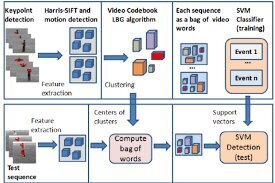Event Detection using AI Models and Frameworks
Event detection is a crucial task in various domains, leveraging artificial intelligence to identify and analyze significant occurrences within data streams. This field has seen significant advancements with the introduction of sophisticated AI models and frameworks[1][4].
EventNet
EventNet is a deep learning framework designed specifically for event detection in complex environments. It utilizes a hierarchical structure to capture both low-level and high-level event features, enabling it to detect a wide range of events with high accuracy[3]. EventNet’s architecture allows it to process multimodal data, making it particularly useful in scenarios where events may manifest across different data types, such as video, audio, and text.
Anomaly Detection Networks
Anomaly Detection Networks (ADNs) are a class of AI models that excel at identifying unusual patterns or outliers in datasets[1]. These networks are particularly effective in scenarios where normal behavior can be well-defined, and deviations from this norm are considered events of interest. ADNs often employ unsupervised or semi-supervised learning techniques, allowing them to adapt to evolving data patterns without extensive labeled training data[4].
Applications and Benefits
The application of these AI models in event detection spans various industries:
- Cybersecurity: Detecting intrusion attempts and unusual network behavior[1]
- Finance: Identifying fraudulent transactions and market anomalies
- Healthcare: Monitoring patient data for critical health events
- Industrial IoT: Predicting equipment failures and maintenance needs
By leveraging AI for event detection, organizations can process large volumes of data in real-time, significantly reducing the time to detect and respond to critical events[1][5].
Challenges and Future Directions
Despite their effectiveness, event detection AI models face challenges such as:
- Dealing with false positives and maintaining high precision
- Scaling to handle increasingly large and complex datasets
- Ensuring interpretability of detection results for human operators[5]
Future research in this field is focused on developing more robust models that can handle diverse data types, improve real-time processing capabilities, and enhance the explainability of AI-driven event detection systems[4].
Event detection using AI continues to evolve, promising more accurate, efficient, and versatile solutions for identifying critical occurrences across various domains. As these technologies advance, they will play an increasingly vital role in enabling proactive decision-making and rapid response to significant events.
Further Reading
1. Anomaly Detection Using AI & Machine Learning | Nile
2. Methods to Detect an Event using Artificial Intelligence and Machine Learning | IEEE Conference Publication | IEEE Xplore
3. ScienceDirect
4. AI for Anomaly detection in network area | Women in Tech Network
5. AI Anomaly Detection: Applications and Challenges in 2024


